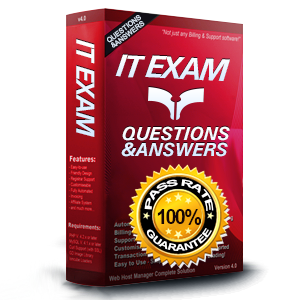
HS-330 Exam Questions & Answers
Exam Code: HS-330
Exam Name: Fundamentals of Estate Planning Test
Updated: Apr 30, 2024
Q&As: 400
At Passcerty.com, we pride ourselves on the comprehensive nature of our HS-330 exam dumps, designed meticulously to encompass all key topics and nuances you might encounter during the real examination. Regular updates are a cornerstone of our service, ensuring that our dedicated users always have their hands on the most recent and relevant Q&A dumps. Behind every meticulously curated question and answer lies the hard work of our seasoned team of experts, who bring years of experience and knowledge into crafting these premium materials. And while we are invested in offering top-notch content, we also believe in empowering our community. As a token of our commitment to your success, we're delighted to offer a substantial portion of our resources for free practice. We invite you to make the most of the following content, and wish you every success in your endeavors.

Download Free American College HS-330 Demo
Experience Passcerty.com exam material in PDF version.
Simply submit your e-mail address below to get started with our PDF real exam demo of your American College HS-330 exam.
![]() Instant download
Instant download
![]() Latest update demo according to real exam
Latest update demo according to real exam
* Our demo shows only a few questions from your selected exam for evaluating purposes
Free American College HS-330 Dumps
Practice These Free Questions and Answers to Pass the American College Certification Exam
Which of the following statements concerning both the joint tenancy with right of survivorship and the tenancy by the entirety forms of real property ownership is correct?
A. Both forms of ownership are restricted to two equal owners at any one time.
B. Both forms of ownership provide that an owner can sell his interest in the property at any time without destroying the form of ownership.
C. Both forms of ownership provide that a deceased owner's interest passes to the surviving owner.
D. Both forms of ownership are restricted to husband and wife.
Which of the following statements concerning the imposition of state death taxes on property owned by a decedent is (are) correct?
1.
Real estate must be taxed in the state where the decedent was domiciled.
2.
Intangible personal property is generally taxed in the state where the decedent was domiciled.
A. 2 only
B. 1 only
C. Neither 1 nor 2
D. Both 1 and 2
All the following powers held by the grantor of an irrevocable trust will cause the trust assets to be brought back into the estate of the grantor EXCEPT the power to
A. terminate the trust
B. add principal to the trust
C. designate who shall enjoy the trust income
D. change the trust remainderpersons
A father died leaving his property equally to his wealthy son and his poor daughter. The son wishes to disclaim his share of the inheritance so that it will pass to his sister without his incurring any gift tax liability. In this situation, all the following acts on the part of the son are required EXCEPT:
A. His refusal to accept the inheritance must be received by the executor of his father's estate within 9 months of his father's death.
B. His refusal to accept the inheritance must direct specifically that his sister is to receive it instead.
C. His refusal to accept the inheritance must be in writing.
D. He must not have received any part of his inheritance or any income from it prior to his refusal to accept it.
The decedent, D, died this year. The facts concerning D estate are:
-Gross estate $3,400,000
-Marital deduction 0
-Charitable deduction 600,000
-Funeral and administration expenses 80,000
-Gifts made after 1976 170,000
-
State death taxes payable 192,000
A.
$2,720,000
B.
$2,358,000
C.
$2,138,000
D.
$2,528,000
Viewing Page 3 of 3 pages. Download PDF or Software version with 400 questions

